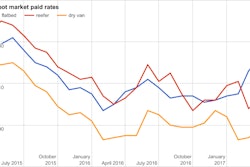
No other trucking-specific measures appear to be included in the appropriations act. Such bills have been vehicles for reforms on hours of service and other trucking-focused legislation in recent years.
The Consolidated Appropriations Act 2017 cleared the House Wednesday and the Senate Thursday. It now heads to the White House for President Trump’s signature. He is expected to sign the bill, which keeps the government funded through September 30.
The DOT’s Federal Motor Carrier Safety Administration is already well underway in development, deployment and testing of a wireless inspection system, announcing last year it was beginning a third phase of testing involving about 600 trucks and drivers. The system’s aim is to inspect vehicles and drivers without the need to stop, via roadside sensors and transmission of vehicle information. The agency said last year it could be able to make a “go, no-go” determination on the feasibility of a national wireless inspection program as early as September 2017. It’s unclear whether the 2017 appropriations bill will affect that timeline.
The bill restricts work on the program by withholding funding for “design, development, testing or implementation of a wireless roadside inspection program until 180 days after [the DOT] certifies to” Congressional appropriations committees “that such program does not conflict with existing non-federal electronic screening systems, create capabilities already available or require additional statutory authority to incorporate generated inspection data into safety determinations or databases.”
The bill also requires the DOT to address privacy concerns of carriers and drivers regarding wireless inspection data.












